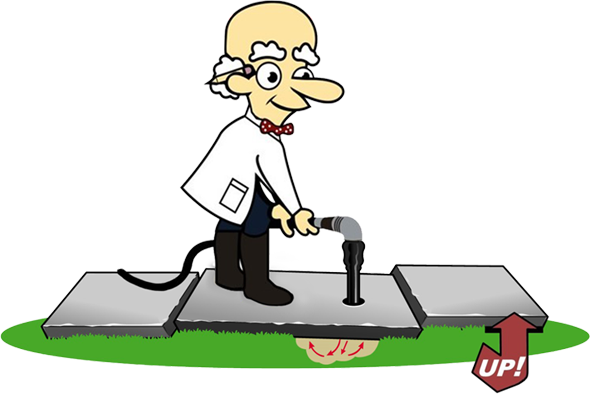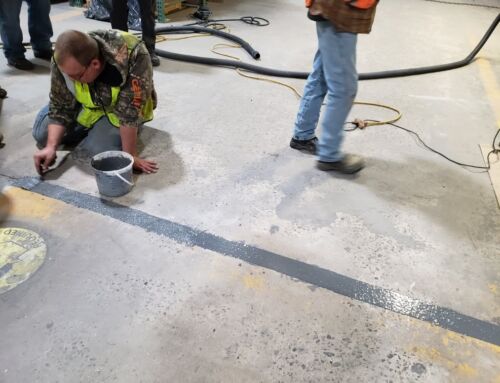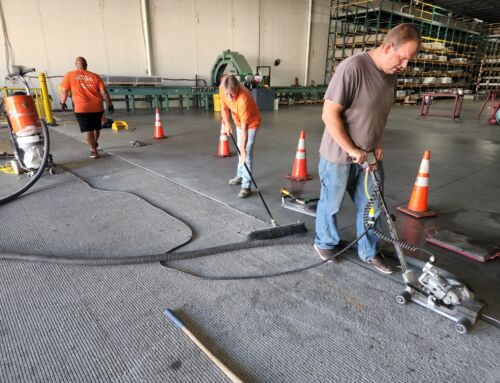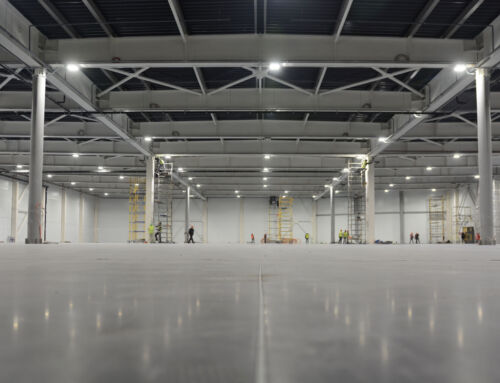IN THIS ARTICLE
Edison, New Jersey, is home to a bustling industrial sector with numerous warehouses that support logistics, manufacturing, and distribution. Known for its historical importance and central location, Edison is a prime spot for businesses requiring durable, long-lasting concrete floors.
However, the unique climate conditions and local environmental factors present specific challenges for warehouse concrete floors. Properly sealing these floors can extend their lifespan, enhance safety, and reduce maintenance costs.
With years of experience as warehouse concrete floor experts in NJ, we’ve developed best practices to address Edison’s specific conditions. This guide provides everything you need to know about sealing warehouse concrete floors in Edison, from choosing the right sealant to maintaining your floor for the long haul.
Why Warehouse Floor Sealing Matters in Edison, NJ
The first step to understanding the importance of floor sealing is recognizing Edison’s unique climate and geographical features. Located in Middlesex County, Edison has a humid subtropical climate, which means hot, humid summers and cold winters.
Temperatures can range from mid-80s in summer to lows in the 20s during winter, creating expansion and contraction in concrete floors that can lead to cracks over time. The high humidity and significant annual precipitation also make moisture a constant challenge for concrete surfaces.
Popular locations in Edison, such as the Raritan Center, one of the largest business parks on the East Coast, and other industrial hubs, need reliable, resilient floors that can withstand foot and machinery traffic and the effects of the local climate.
That’s where high-quality sealing comes in—it offers protection against temperature fluctuations, moisture, and heavy usage, ensuring warehouse floors remain in excellent shape.
Best Practices for Sealing Warehouse Concrete Floors in Edison
To get the most out of your warehouse floor in Edison, follow these best practices, which address both local conditions and general requirements for effective concrete floor sealing.
1. Proper Surface Preparation
Surface preparation is the cornerstone of successful sealing. A properly prepared surface will ensure that the sealant bonds effectively, creating a lasting protective layer. Prepping the surface thoroughly is essential in Edison, where high humidity and temperature shifts can wear down concrete.
Steps for Proper Preparation:
- Cleaning: Begin by sweeping and power washing the floor to remove dirt, oil, and debris. Oil and grime can interfere with adhesion, so a deep clean is crucial.
- Repairing Cracks: Any cracks or chips should be filled and leveled before sealing. Cracks allow moisture to penetrate, especially in Edison’s humid climate, which can freeze and expand during colder months, worsening the damage.
- Drying: Ensure the floor is completely dry before applying the sealer. Sealing over moisture can trap it inside, which may lead to bubbling, peeling, or mold growth. Given Edison’s high humidity, extra drying time is sometimes needed.
2. Choosing the Right Sealer for Edison’s Climate
Not all sealers are created equal, and in Edison’s environment, you’ll want to select a sealer that can handle temperature changes, moisture, and the specific needs of a busy warehouse.
Types of Sealers to Consider:
- Epoxy Sealers: Epoxy is one of the best options for high-traffic areas due to its durability and resistance to chemicals, oil, and abrasions. It provides a seamless finish that withstands frequent use, making it ideal for warehouses.
- Urethane Sealers: Urethane is another top choice as it offers flexibility that helps accommodate the expansion and contraction caused by temperature fluctuations. This sealer is also resistant to yellowing and UV damage, which is a consideration if your warehouse has open spaces exposed to sunlight.
- Penetrating Sealers: Penetrating sealers can be a great option for a more natural appearance. They work below the surface, creating a barrier against water and stains without changing the look of the concrete.
3. Application Process: Best Techniques for Long-Lasting Results
Applying a concrete sealer correctly requires attention to detail and the right tools. For warehouses, it’s important to ensure the application is even and thorough to avoid weak spots that may wear down prematurely.
Key Application Tips:
- Choose the Right Tools: Rollers, brushes, and sprayers can all be used depending on the type of sealer and the floor’s condition. Sprayers work well for penetrating sealers, while rollers are better for thicker coatings like epoxy.
- Even Application: Ensure the sealer is applied evenly. Overlapping strokes with rollers or sprayers helps prevent streaks and create a consistent layer.
- Multiple Coats: Follow the manufacturer’s guidelines on the number of coats. Many sealers recommend two to three coats, especially for high-traffic areas.
In Edison’s industrial zones, where warehouse floors experience constant use, careful application and warehouse floor repairs will pay off in terms of longevity and durability. Our team follows a meticulous process to achieve the best possible results.
4. Drying and Curing Times: Ensuring a Strong, Durable Seal
After applying the sealer, allow ample time to dry and cure thoroughly. This is especially important in Edison, where high humidity can lengthen drying times. Rushing this step can lead to weak spots or areas where the sealer doesn’t adhere fully.
Curing Guidelines:
- Drying Time: Most sealers dry in a few hours, but high humidity may require extended time. It’s best to follow the manufacturer’s recommendations closely.
- Curing Time: Full curing can take up to a week, during which the warehouse floor should be protected from heavy traffic. This curing phase is essential for the sealer to achieve maximum hardness and protection.
We understand the importance of drying and curing, and our team accounts for Edison’s local humidity levels to ensure a proper set, leaving your floor resilient and fully protected.
Local Tips for Sealing Warehouse Floors in Edison
In addition to following best practices, here are some local tips specific to Edison’s environment and requirements.
Climate Considerations
Edison’s humid summers and cold winters can damage concrete floors. High humidity in the summer can lead to moisture issues, while freeze-thaw cycles in winter can expand any moisture trapped in concrete pores. Sealers with moisture-blocking properties and those that can flex with temperature changes are key to preventing cracking and other issues.
Moisture Management
Given Edison’s significant precipitation levels and occasional flooding in some areas, it’s wise to implement drainage solutions to prevent water from pooling around the warehouse foundation. Keeping the floor and surrounding areas dry helps extend the lifespan of the sealant. Our team can recommend drainage solutions that work well with warehouse spaces, helping prevent moisture-related damage over time.
Local Concrete Regulations and Safety Standards
Edison adheres to New Jersey’s building codes and concrete regulations, ensuring that warehouses are maintained for safety and environmental impact. These standards include using non-toxic sealants and proper application methods to protect workers and the environment.
As one of the leading concrete experts in New Jersey, we stay up-to-date with these standards and can help you choose sealers that comply with local laws while delivering excellent durability, especially when it comes to concrete repairs.
Maintaining a Sealed Concrete Floor in Edison
Once sealed, a concrete floor requires regular maintenance to remain in top shape, especially in high-traffic warehouse environments. Here’s what we recommend for keeping a sealed floor in Edison at its best:
- Regular Sweeping and Mopping: Dust, debris, and minor spills should be cleaned regularly to prevent abrasion and wear on the sealant.
- Periodic Inspections: Check for any signs of wear, peeling, or cracks, especially after seasonal changes when temperature shifts can affect the floor.
- Scheduled Resealing: In most cases, resealing every 3-5 years is ideal. In high-traffic areas, resealing more frequently to maintain the protective layer may be necessary.
Conclusion
Sealing a warehouse concrete floor in Edison, NJ, is essential to ensuring its durability, safety, and low maintenance. By following best practices—like thorough preparation, selecting the right sealer, applying it with care, and accounting for Edison’s unique climate and conditions—you can maximize the lifespan and performance of your concrete floor.
Our expertise as a warehouse concrete floor professionals ensures we understand Edison’s specific challenges. Whether you need guidance on choosing the best sealer, precise application, or long-term maintenance, our team is here to help. Reach out to us today for professional advice tailored to Edison’s climate and the demands of your warehouse environment.
FAQ:
What Makes Urethane Cement Ideal for Warehouse Flooring?
Urethane cement is highly durable, resistant to chemicals, and flexible enough to withstand temperature fluctuations, making it ideal for the heavy-duty demands of warehouse flooring.
What is the Benefit of Warehouse Concrete Floor Polishing in New Jersey?
Polishing a stained concrete floor improves durability, reduces dust, and creates a smooth, easy-to-clean surface, which is especially beneficial in New Jersey’s varied climate.
How Soil Conditions in Edison Affect Concrete Over Time
Edison’s soil can experience seasonal moisture changes, causing the ground to expand and contract. If not properly managed, this can lead to cracking or shifting concrete over time.
- The Average Cost of Concrete Warehouse Floor Repair in Woodbridge, NJ. - February 3, 2025
- The Average Cost of Concrete Warehouse Floor Repairs in Avenel, NJ. - February 3, 2025
- What You Need to Know about Concrete Floor Sealing for Secaucus Warehouses - November 16, 2024
